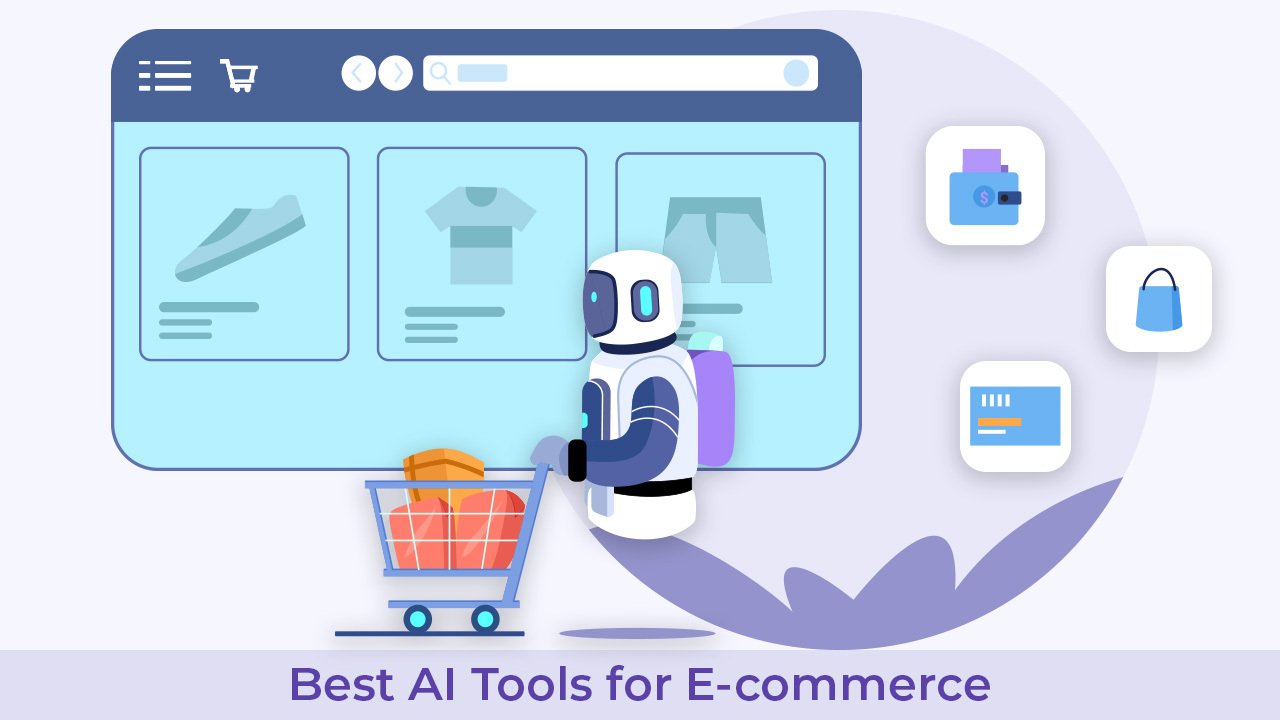In the ever-evolving landscape of e-commerce, staying competitive and providing exceptional customer experiences has become top priority for businesses. This is where Artificial Intelligence (AI) tools come into play, revolutionizing how e-commerce operates. AI tools have proven to be game-changers, offering innovative solutions to enhance various aspects of online retail, from personalized shopping experiences to efficient inventory management. In this article, we will delve into the realm of AI tools for e-commerce, exploring how they are reshaping the industry and empowering businesses to optimize operations, boost conversions, and create a seamless shopping journey for customers.
Table of Contents
ToggleBenefits of Using Artificial Intelligence(AI) in E-commerce
The integration of Artificial Intelligence (AI) into e-commerce operations offers a plethora of benefits that revolutionize how businesses operate and interact with their customers. Some of the key advantages of using AI in e-commerce include:
- Personalization: AI analyzes customer data and behavior to deliver highly personalized shopping experiences. This leads to improved customer satisfaction, higher engagement, and increased loyalty.
- Enhanced Customer Experience: AI-powered chatbots and virtual assistants provide real-time support, addressing customer queries and concerns 24/7, leading to improved customer experience.
- Recommendation Systems: AI-driven recommendation engines suggest relevant products to customers based on their preferences and browsing history, boosting cross-selling and upselling opportunities.
- Dynamic Pricing: AI algorithms monitor market trends, competitor pricing, and demand to adjust prices in real-time, optimizing revenue and competitiveness.
- Visual Search: AI enables customers to search for products using images, simplifying the search process and offering a more engaging experience.
- Inventory Management: AI algorithms predict demand and optimize inventory levels, reducing overstocking and stockouts, thus improving efficiency and reducing costs.
- Fraud Prevention: AI identifies patterns of fraudulent activities, enhancing security and protecting both customers and businesses from online threats.
- Data-Driven Insights: AI analyzes vast amounts of data to provide actionable insights, aiding in decision-making, trend identification, and customer behavior analysis.
- Automated Customer Support: AI-driven chatbots provide instant responses to customer queries, reducing response times and improving overall support efficiency.
- Conversion Rate Optimization: AI tests and optimizes website elements to improve conversion rates and user experience.
- Predictive Analytics: AI models forecast trends and customer behavior, enabling businesses to proactively address market shifts and meet customer demands.
- Marketing Automation: AI automates marketing campaigns, targeting the right audience with the right message at the right time, improving marketing ROI.
- Virtual Try-Ons: AI-powered virtual try-ons allow customers to visualize how products will look on them, enhancing the online shopping experience.
- Language Translation: AI facilitates seamless communication with customers globally by offering real-time language translation.
- Time and Cost Savings: AI automates routine tasks, allowing businesses to allocate resources more efficiently and focus on strategic initiatives.
The implementation of AI in e-commerce transcends mere technological advancement; it reshapes the entire landscape by creating personalized, efficient, and engaging shopping experiences. By harnessing the power of AI, businesses can achieve competitive advantages, unlock new revenue streams, and forge stronger customer relationships in the dynamic world of online commerce.
Also Reads: BigCommerce vs WooCommerce – Which One Should You Choose?
The Functional Areas Where AI Tools Can Help E-commerce Store Owners
AI tools offer significant value across various functional areas for e-commerce store owners, enhancing operations, improving customer experiences, and driving business growth. Some key functional areas where AI tools can provide substantial benefits include:
- Product Recommendations: AI-powered recommendation engines analyze customer data to provide personalized product suggestions, increasing cross-selling and upselling opportunities.
- Customer Support and Chatbots: AI-driven chatbots offer 24/7 customer support, addressing inquiries, providing assistance, and resolving issues in real-time.
- Personalized Marketing: AI tailors marketing campaigns based on customer behavior, preferences, and purchase history, boosting engagement and conversions.
- Dynamic Pricing: AI algorithms adjust pricing in response to market dynamics, demand fluctuations, and competitor pricing strategies, optimizing revenue.
- Inventory Management: AI forecasts demand patterns, helping optimize inventory levels, reducing overstocking and stockouts, and minimizing costs.
- Fraud Detection and Prevention: AI identifies unusual transaction patterns and behaviors, enhancing fraud prevention and securing financial transactions.
- Search and Navigation: AI enhances search functionality by providing accurate and relevant search results, improving user experience and product discovery.
- Visual Search: AI-driven visual search enables customers to find products using images, simplifying the search process and boosting engagement.
- Conversion Rate Optimization: AI tests and optimizes website elements to improve conversion rates, such as call-to-action buttons and layout designs.
- Predictive Analytics: AI analyzes historical data to predict future trends, enabling informed decision-making and proactive strategies.
- Virtual Try-Ons: AI-powered virtual try-ons allow customers to visualize how products look on them, enhancing the online shopping experience.
- Language Translation: AI provides real-time language translation, enabling businesses to communicate with global customers effectively.
- Email Marketing Optimization: AI automates email campaigns, tailoring content and timing to maximize open rates and conversions.
Also Reads: 7 Best WooCommerce Alternatives for Your WordPress Store 2024
Here Are 10 Of The Best AI Tools For E-commerce
1. Dynamic Yield
Dynamic Yield is a leading AI-powered personalization platform designed to enhance e-commerce experiences by delivering tailored content, recommendations, and interactions to users. With its advanced machine learning algorithms, Dynamic Yield enables businesses to create individualized journeys that optimize customer engagement and drive conversions.
Key Features of Dynamic Yield:
- Personalization: Deliver personalized product recommendations, content, and messages based on user behavior and preferences.
- A/B Testing: Conduct A/B tests to optimize website elements, layouts, and messaging for improved performance.
- Segmentation: Segment audiences based on demographics, behavior, and other factors to provide targeted experiences.
- Real-time Optimization: Automatically adjust content and offers in real time based on user interactions and data insights.
- Predictive Targeting: Use machine learning to predict user preferences and optimize content delivery.
- Omni-Channel Personalization: Extend personalized experiences across various channels, including websites, email, mobile apps, and more.
- Dynamic Messaging: Display dynamic messages and overlays based on user actions to encourage desired behaviors.
- E-commerce Integration: Seamlessly integrate with e-commerce platforms to enhance the online shopping experience.
- Analytics and Insights: Gain actionable insights into user engagement, conversions, and campaign performance.
Dynamic Yield’s focus on leveraging AI to deliver tailored experiences makes it a valuable tool for e-commerce businesses seeking to enhance customer engagement, increase conversions, and boost overall revenue. By presenting relevant content and recommendations, Dynamic Yield helps businesses create a seamless and highly personalized shopping journey for their customers.
Also Read: 10 Best Video Testimonial Software in 2024
2. Apptus
Apptus is an AI-driven e-commerce optimization platform that empowers businesses to deliver personalized shopping experiences, optimize search results, and enhance overall e-commerce performance. With its advanced algorithms and machine learning capabilities, Apptus helps businesses streamline their online operations and provide customers with relevant and engaging interactions.
Key Features of Apptus:
- AI-Powered Search and Navigation: Enhance search functionalities and navigation by providing accurate and contextually relevant results.
- Personalization: Deliver personalized product recommendations and content to users based on their behavior and preferences.
- Merchandising Automation: Automatically optimize product displays, banners, and promotions to maximize conversions.
- Real-time Insights: Gain real-time insights into customer behavior, trends, and performance metrics for informed decision-making.
- Dynamic Pricing: Implement dynamic pricing strategies to adapt to market changes and competitor pricing.
- A/B Testing: Conduct A/B tests to experiment with different strategies and improve the effectiveness of campaigns.
- Automation and Efficiency: Automate repetitive tasks, such as catalog management and merchandising, to save time and resources.
- E-commerce Integration: Seamlessly integrate with e-commerce platforms to enhance the customer shopping experience.
- Search Relevance: Optimize search results to ensure that customers find the products they are looking for quickly and easily.
Apptus’s focus on leveraging AI for search optimization, personalization, and merchandising automation makes it a valuable tool for e-commerce businesses aiming to provide customers with seamless, relevant, and engaging shopping journeys. By optimizing various aspects of the online shopping experience, Apptus helps businesses enhance customer satisfaction, drive conversions, and achieve their revenue goals.
3. Nosto
Nosto is a leading AI-powered personalization platform tailored for e-commerce businesses, designed to deliver dynamic and personalized shopping experiences to customers. By analyzing user behavior and preferences, Nosto enables businesses to create tailored recommendations, content, and interactions that enhance engagement and drive conversions.
Key Features of Nosto:
- Personalization: Deliver personalized product recommendations, content, and messaging based on individual user behavior and preferences.
- Behavioral Segmentation: Segment customers based on their browsing and purchasing behavior to provide targeted experiences.
- Dynamic Emails: Create personalized email campaigns that showcase relevant products and offers to recipients.
- On-site Pop-ups: Display dynamic pop-ups and messages based on user actions to encourage conversions.
- A/B Testing: Test different content and design variations to optimize performance and engagement.
- Predictive Analytics: Utilize AI-driven insights to predict user preferences and optimize content delivery.
- Omni-Channel Personalization: Extend personalized experiences across multiple channels, including websites, emails, and ads.
- Cart Abandonment Recovery: Automatically send personalized reminders to users who abandoned their shopping carts.
- Real-time Optimization: Adapt content and recommendations in real time as users interact with the site.
Nosto’s emphasis on AI-driven personalization makes it a valuable tool for e-commerce businesses looking to enhance customer engagement, increase conversions, and foster brand loyalty. By providing tailored recommendations and experiences, Nosto helps businesses create a more relevant and enjoyable shopping journey, resulting in improved customer satisfaction and revenue growth.
Also Read: How to Set Up Weight-Based Shipping in WooCommerce?
4. Rekko
Rekko is an AI-powered personalization and optimization platform designed to help e-commerce businesses create highly tailored and engaging online experiences for their customers. With its advanced algorithms, Rekko enables businesses to optimize content, offers, and recommendations to drive conversions and enhance customer satisfaction.
Key Features of Rekko:
- Personalization: Deliver personalized product recommendations, content, and messages based on user behavior and preferences.
- A/B Testing: Experiment with different variations of content and offers to identify the most effective strategies.
- Dynamic Content: Display dynamic banners, messages, and pop-ups based on user interactions to encourage desired actions.
- Behavioral Tracking: Track user behavior and interactions to create targeted segments for personalized experiences.
- Real-time Optimization: Adapt content and recommendations in real-time as users navigate through the website.
- Campaign Automation: Automate the delivery of personalized campaigns based on predefined triggers and user actions.
- Multivariate Testing: Test multiple variables simultaneously to find the optimal combination for maximum impact.
- E-commerce Integration: Seamlessly integrate with e-commerce platforms to enhance the customer journey.
- Analytics and Reporting: Gain insights into campaign performance, engagement metrics, and conversion rates.
Rekko’s focus on AI-powered personalization and optimization makes it a valuable tool for e-commerce businesses aiming to create more relevant and engaging online experiences. By tailoring content and recommendations to individual user preferences, Rekko helps businesses enhance customer engagement, drive conversions, and ultimately achieve their business goals.
5. ChatGPT
ChatGPT is an advanced language model developed by OpenAI that utilizes artificial intelligence to engage in natural and dynamic conversations with users. While it’s not specifically designed as an e-commerce tool, it can certainly be integrated into e-commerce platforms to enhance customer interactions, provide support, and assist shoppers in their purchasing journey.
Key Features of ChatGPT:
- Natural Conversations: Engage in human-like conversations with customers, answering their queries and providing assistance.
- Customer Support: Offer real-time customer support by addressing inquiries, providing information, and guiding users through the shopping process.
- Personalized Recommendations: Generate personalized product recommendations based on user preferences and requirements.
- FAQ Assistance: Provide answers to frequently asked questions, helping customers find information quickly.
- 24/7 Availability: ChatGPT can be available round the clock, providing continuous support and engagement.
- Order Tracking: Help customers track their orders, check delivery status, and resolve any order-related issues.
- Product Information: Offer detailed information about products, features, specifications, and pricing.
- Engagement and Retention: Keep customers engaged on the website, increasing their likelihood of making a purchase.
While not a traditional e-commerce tool, integrating ChatGPT into an e-commerce platform can enhance customer engagement, improve user experience, and streamline customer support. By offering real-time assistance and personalized interactions, businesses can create a more interactive and customer-centric online shopping environment.
Also Read: Best YouTube Transcript Generator Tools
6. Wiser
Wiser is an AI-driven retail intelligence platform that empowers e-commerce businesses to gather, analyze, and act on valuable data insights to optimize pricing strategies, monitor competitor activities, and enhance overall business performance.
Key Features of Wiser:
- Price Optimization: Utilize AI algorithms to set optimal pricing strategies based on market trends, demand, and competition.
- Competitor Monitoring: Track and analyze competitor prices, promotions, and inventory to make informed decisions.
- Dynamic Pricing: Implement dynamic pricing strategies that adjust prices in real time based on market changes.
- Assortment Management: Optimize product offerings by analyzing customer preferences and market demand.
- MAP Monitoring: Monitor Minimum Advertised Price (MAP) compliance to ensure consistent pricing across sales channels.
- Data Analytics: Gain actionable insights from data analytics to inform pricing, inventory, and marketing strategies.
- Channel Management: Manage pricing and product information across various online sales channels.
- Alerts and Notifications: Receive alerts about price changes, stock levels, and competitor activities.
- Retail Intelligence: Leverage AI-powered insights to make informed decisions and adapt to market trends.
Wiser’s focus on AI-driven retail intelligence makes it a valuable tool for e-commerce businesses aiming to optimize pricing, stay competitive, and make data-driven decisions. By leveraging advanced analytics and competitor insights, Wiser helps businesses enhance their pricing strategies, improve profitability, and achieve better results in the dynamic e-commerce landscape.
7. Sentient AI
Sentient AI is an AI-powered optimization platform that offers a range of solutions to enhance e-commerce experiences and improve online performance. Through its advanced algorithms and machine learning capabilities, Sentient AI enables businesses to optimize various aspects of their e-commerce operations to drive conversions and enhance user satisfaction.
Key Features of Sentient AI:
- Conversion Rate Optimization (CRO): Utilize AI-driven optimization techniques to enhance website elements and improve conversion rates.
- Visual Search: Implement visual search capabilities that enable users to find products using images.
- Personalized Recommendations: Deliver tailored product recommendations based on user behavior and preferences.
- A/B Testing: Experiment with different variations of website elements to identify the most effective strategies.
- Dynamic Pricing: Implement dynamic pricing strategies to optimize product pricing based on market trends.
- Visual Discovery: Enable customers to discover products through visual search, enhancing user experience.
- Behavioral Analysis: Analyze user behavior to gain insights and make data-driven decisions for optimization.
- Multivariate Testing: Test multiple variables simultaneously to find the optimal combination for maximum impact.
- E-commerce Integration: Seamlessly integrate with e-commerce platforms to enhance online performance.
Sentient AI’s focus on optimization and personalization makes it a valuable tool for e-commerce businesses aiming to improve user engagement, increase conversions, and boost overall revenue. By leveraging AI-driven insights and techniques, Sentient AI helps businesses create a more relevant and engaging online experience, driving customer satisfaction and business growth.
Also Read: Enhancing Your Node.js Experience: Customizing With Server Configuration
8. Cortexica
Cortexica is an AI-driven visual recognition and search platform that offers e-commerce businesses the ability to enhance their product discovery and search capabilities using image recognition technology. By analyzing images and visual content, Cortexica helps businesses create seamless and intuitive visual search experiences for their customers.
Key Features of Cortexica:
- Visual Search: Enable users to search for products using images, making the search process more intuitive and engaging.
- Image Recognition: Utilize AI algorithms to recognize and categorize products based on their visual attributes.
- Similar Product Matching: Provide users with similar product recommendations based on visual characteristics.
- Visual Discovery: Enhance the shopping journey by enabling users to discover products that match their preferences.
- Mobile Integration: Seamlessly integrate visual search capabilities into mobile apps for on-the-go shopping.
- E-commerce Integration: Integrate with e-commerce platforms to enhance the product search and discovery experience.
- Customization: Customize the visual search experience to align with your brand’s identity.
- Data Insights: Gain insights into customer preferences and behaviors through visual search analytics.
Cortexica’s focus on visual recognition and search makes it a valuable tool for e-commerce businesses looking to provide a more interactive and user-friendly shopping experience. By allowing users to search for products using images, Cortexica enhances engagement, simplifies product discovery, and contributes to a more satisfying online shopping journey.
9. Sift
Sift is an AI-powered platform that specializes in fraud prevention and risk management for e-commerce businesses. By leveraging advanced machine learning algorithms, Sift helps businesses detect and prevent fraudulent activities, protect customer data, and maintain the integrity of their online transactions.
Key Features of Sift:
- Fraud Detection: Utilize AI algorithms to identify and prevent fraudulent activities, such as payment fraud and account takeovers.
- User Behavior Analysis: Analyze user behavior and patterns to detect anomalies and suspicious activities.
- Transaction Screening: Screen transactions in real-time to identify and block potentially fraudulent orders.
- Device Fingerprinting: Create unique digital fingerprints for devices to detect and prevent unauthorized access.
- Content Moderation: Automate content moderation to prevent malicious content from affecting user interactions.
- Identity Verification: Verify user identities through various methods to prevent unauthorized access.
- Chargeback Prevention: Minimize chargebacks by detecting and addressing fraudulent transactions.
- Data Insights: Gain insights into fraud trends and patterns to improve prevention strategies.
Sift’s focus on fraud prevention and risk management makes it a valuable tool for e-commerce businesses seeking to protect their customers and their own operations from fraudulent activities. By leveraging AI-driven insights and real-time detection, Sift helps businesses maintain trust, security, and compliance in the dynamic e-commerce landscape.
Also Read: 5 Cybersecurity Threats You Must Know As A Web Developer
10. Optimizely
Optimizely, now part of Episerver is an AI-driven experimentation and optimization platform designed to empower businesses to enhance their digital experiences, optimize user journeys, and improve overall performance across their websites and applications.
Key Features of Optimizely:
- Experimentation: Run A/B tests and multivariate experiments to optimize various elements of your digital properties.
- Personalization: Deliver personalized content, offers, and experiences based on user behavior and preferences.
- AI Recommendations: Utilize AI-driven recommendations to enhance content delivery and engagement.
- Dynamic Content: Create dynamic experiences by displaying content based on user interactions and segments.
- Conversion Optimization: Optimize user journeys to increase conversion rates and achieve business goals.
- Data Insights: Gain actionable insights from data analytics to inform optimization strategies.
- Real-time Optimization: Adapt content and experiences in real-time based on user interactions.
- Mobile Optimization: Extend optimization strategies to mobile apps for consistent user experiences.
- Integration: Seamlessly integrate with other tools and platforms for streamlined optimization.
Optimizely’s focus on experimentation and optimization makes it a valuable tool for businesses looking to fine-tune their digital experiences, increase engagement, and drive conversions. By utilizing AI-driven insights and real-time adaptation, Optimizely helps businesses create more effective and user-centric digital properties.
Conclusion
In the fast-paced world of e-commerce, where personalized experiences, efficient operations, and data-driven decisions are crucial for success, AI tools have emerged as invaluable assets for businesses. These AI-driven solutions offer a range of capabilities that transform how e-commerce operates, ultimately leading to improved customer satisfaction, increased conversions, and enhanced business outcomes.
From personalized product recommendations to dynamic pricing strategies, AI tools bring a new level of sophistication and precision to e-commerce operations. They enable businesses to gain deep insights into customer behavior, predict trends, and adapt strategies in real time. By harnessing the power of AI, e-commerce businesses can create seamless and tailored shopping journeys that resonate with customers on a personal level.
Interesting Reads
WP EasyCart vs ImpleCode: Comparison of WordPress E-commerce Plugin
Best Employee Scheduling Software Of 2024
Its High Time To Change Old Powerpoint: Morden Software For Presentation








